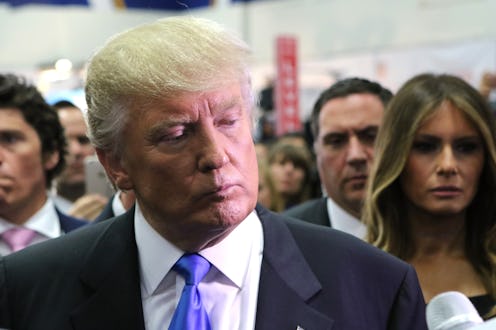News
Don't Speculate About Trump's Mental Health

The flurry of executive orders President Donald Trump signed in his first few days as president, and the resultant fallout, has sent speculation on his mental health into overdrive. The New York Daily News, The Independent, and U.S. News & World Report all recently published articles on the topic, while Nobel-Prize-winning New York Times contributor Paul Krugman tweeted that Trump was "obviously mentally ill the moment he took office." All of these pieces, and the ones that came before them, are looking for reasons for Trump's destructiveness, settling on mental illness as the only logical answer. However, people need to be careful when talking about Trump this way. It can far too easily devolve into the type of ableism and shaming that harmfully stigmatizes mental illness for the rest of us.
Now, as someone living with a mental illness, even I have used the word "crazy" more than once to refer to Trump's hateful words and actions in the days since his inauguration. And while conversations about the president's state of mind should not be off limits, we do need to be careful about how we are conducting them.
Reducing Trump's actions to simply being the symptoms of a supposed undiagnosed mental illness make me and so many others uncomfortable and angry for a number of reasons.
First of all, just because someone is living with a mental illness doesn't mean they are bad. This seems like it should be obvious, but it's not, especially considering the huge stigma against illnesses such as schizophrenia, bipolar disorder, and major depressive disorder, among so many others. And if that social stigma isn't obvious, just look to pop culture where the basis of a number of fictional villains' evil — think the Joker, Hannibal Lecter, Norman Bates — is their insanity.
This past October, I went to a haunted house where all the "monsters" were explained to be escaped patients from a nearby mental hospital. Meanwhile, the threat of being labeled "crazy" and losing credibility as a rational person keeps so many people from seeking help for and openly discussing their mental illnesses. Linking mental illness to Trump's discriminatory actions isn't helping anything.
Secondly, millions of people living with mental illnesses contribute wonderful things to the world. When Carrie Fisher died last month, it was heartening to hear about how many lives she touched by being open about her struggles with addiction and bipolar disorder. Artists like Brian Wilson, Demi Lovato, Jim Carrey, Catherine Zeta-Jones, and so many others have flipped the script by sharing their mental health experiences with the public. And let's not forget world leaders, either. Abraham Lincoln lived with depression. As did Martin Luther King, Jr. John F. Kennedy experienced manic symptoms during his time in office. Yet none of these people ever called for Muslims, refugees, or Mexicans to be turned away from U.S. borders.
Last but not least, speculations about Trump's mental illness let him off the hook too easily, insinuating that he is somehow not fully responsible for the choices he is making. Focus is being placed on a mental illness he may have rather than the actual bigoted and hateful statements he has made and actions he has taken. However, xenophobia, Islamophobia, sexism and racism aren't the products of Trump's supposed mental illness. They are the products of his very real ignorance and the very real white supremacy and patriarchy of the society that we all find ourselves in today.
Diagnosing Trump with a personality disorder from afar may make some people feel better because it others people with mental illness, distancing us from the problems he represents. However, if we as a nation truly want to root out the prejudices and injustices that helped bring Trump to power, we need to stop stigmatizing mental illness as a distraction.
Let's take a good hard look at the societal structures in place that allow things like the refugee ban to happen. And let's take closer looks at the ableist language we use that contributes to the marginalization of people living with mental illness. Next time you're thinking of reducing Trump to simply being a "crazy person," step back and think about the people you're really hurting with such statements. It's not Trump, but rather those around you struggling to get help for an illness that is causing them pain.